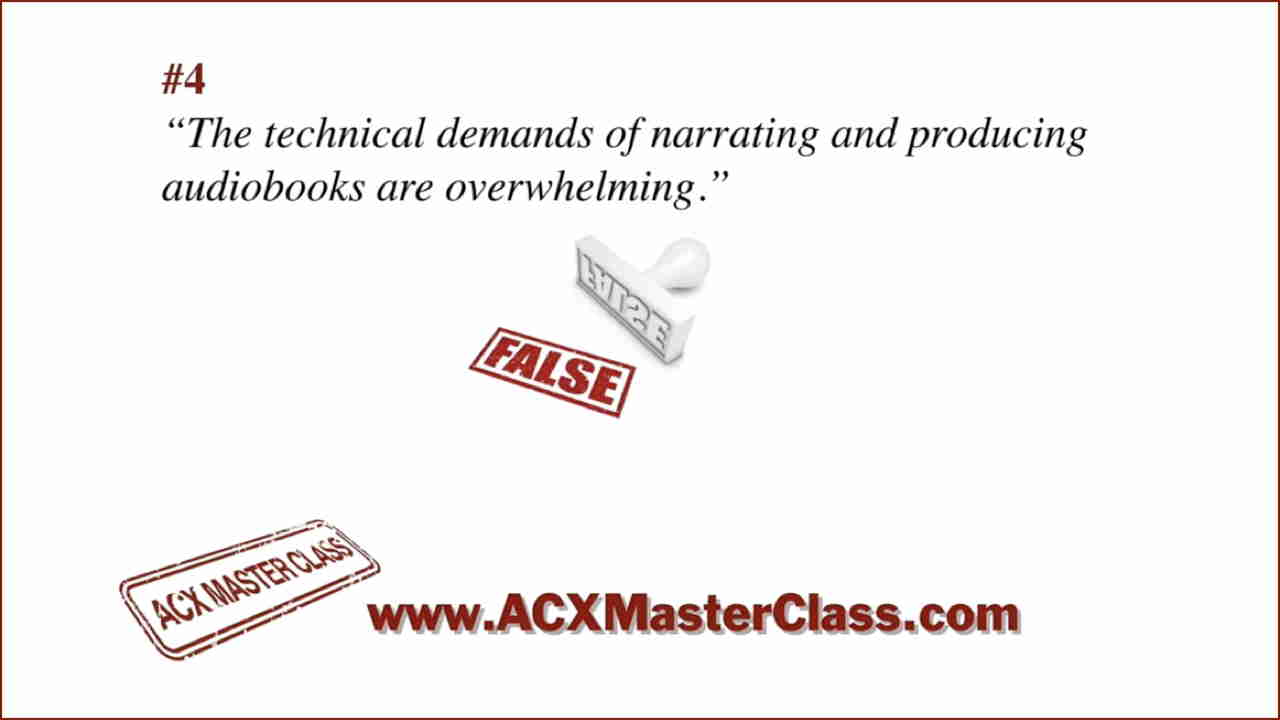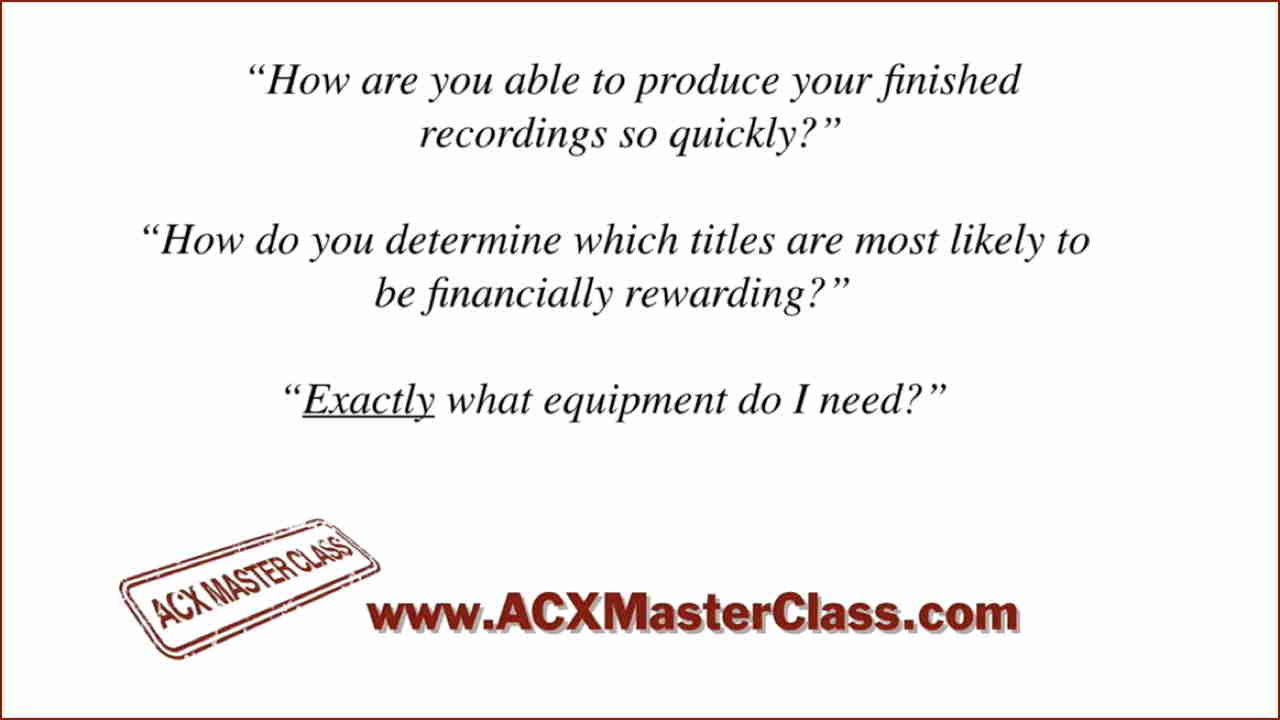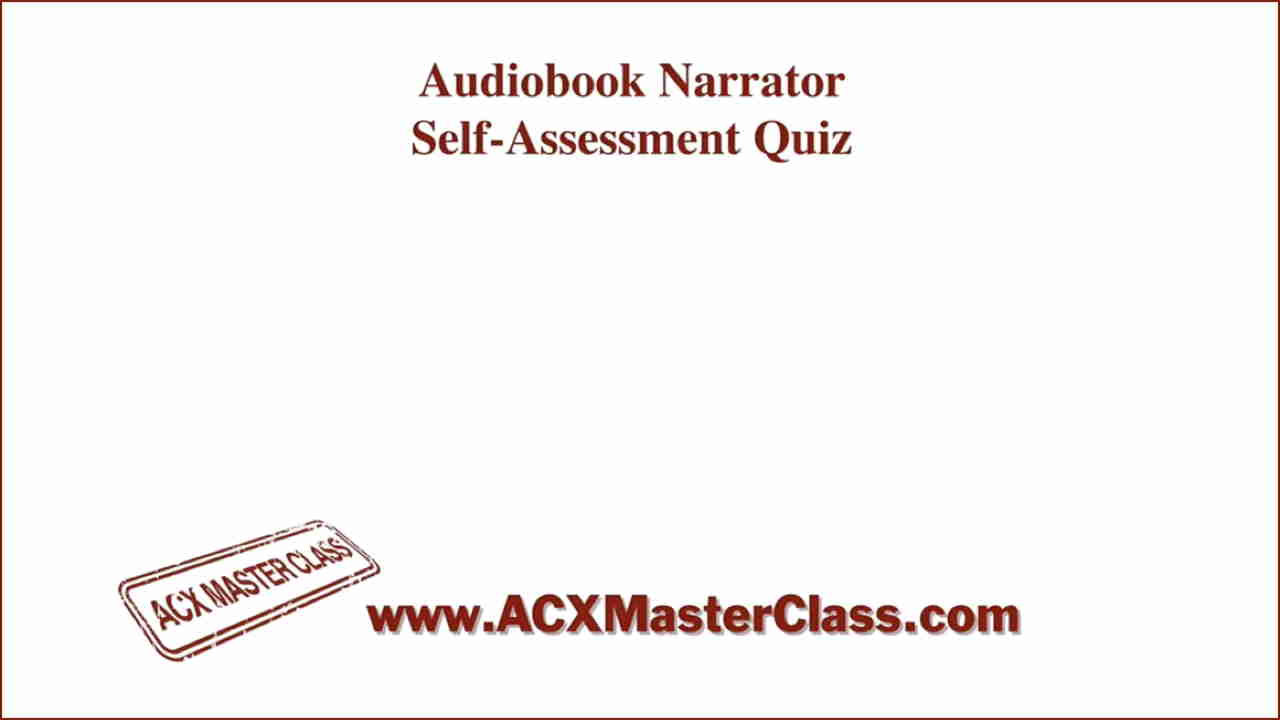How a Retired Air Traffic
Controller Launched a
Thriving New Career as an
Audiobook Narrator (Video 1)
To pause or resume the video, tap the “Play” button on the screen.
Running time: 46 minutes
Scroll down to leave a comment or question you have below the links and the Alert List sign-up
(and be sure to join the Alert List to be notified when the next video is released!)

(YOU’RE WATCHING: VIDEO 1) How a Retired Air Traffic Controller Launched a Thriving New Career as an Audiobook Narrator
Don’t believe “The 7 Myths You’ve Heard About Narrating Audiobooks!”

(CLICK HERE TO WATCH: VIDEO 2) The Art of Picking the Right Audiobook Projects
Plus: Mistakes most ACX narrators make with their profiles

(CLICK HERE TO WATCH: VIDEO 3) The Secret of Accrued Audiobook Assets
Plus: Case study of one narrator who went from “newbie” to ”star” with his first audiobook
Feel free to ask your questions here…Dan and I are ready to answer them and help you begin your journey as an audiobook narrator on ACX, for Audible and for any other production platform or publisher you want to work with.
And remember, if you miss one of the videos, you can click on the little image of that video below the main video on this page, and it will take you to that video that you missed.
So…Just post your questions below.
I am looking to aggressively pursue voiceover as what, hopefully, will be a full time thing, as I currently work in the retail field.
I have had v/o training in the past and, while you never stop training, I am looking to receive more instruction regarding the business end: marketing, networking, demo, etc..
Do you offer any personalized training?
I appreciate your time and assistance.
Regards
Terry
If you mean private, one-on-one training: No, we don’t. But during the class you do have the opportunity to volunteer to be coached (as part of the live Zoom classes) in both fiction and in non-fiction performance.
Re: Instruction regarding the business end, marketing, etc.: That’s a major part of the ACX Master Class. Quoting one of our graduates (from https://www.acxmasterclass.com/kudos/):
“Your ACX Master Class is really unlike any other voiceover class I have taken. In my experience, most classes/workshops leave out the ‘how to do the business’ part, which can take years to figure out (if ever!). Your class dealt with those nuts and bolts, and that is really why I signed up. I was NOT disappointed!”
Looking forward to having you join us, Terry!
I am interested in doing more voice ceover work.
I am a working actor and am represented by 3 different talent agents.
Looking forward to having you as part of our upcoming class, Carole!
Hi Carole! Congrats in having representation.
This class will walk you through the *entire* process of getting into Audiobooks. You might know some of the mic address technique we hear at the beginning, but I’m pretty sure that from there, most if not all of the rest of this will be new and useful for you. That includes understanding the industry and how it works, helping you set up a profile and look for work, put together audiobook demos, and more.
To give you my example, I was green in VO, started this class, and because part of the class includes looking for work, I landed my first two audiobooks before the class was done and shortly thereafter was working on a third.
I think you’ll find the timeframe here much easier than other areas of VO such as commercial, where you have to submit fast, deliver fast, and be available on their time-table. Audiobooks take longer but also give you more control over your hours.
Looking forward to having you join us!
Where is the audiobook work?
We have built the class around how to get work on ACX itself. We do a lot of teaching on how projects are posted there, how to judge them, how to audition for them, and how to choose whether or not you want to pursue any particular project (or not).
We also conclude the course (and touch on it throughout the course) with a module called Beyond ACX, where we show you how to use what you’ve learned in the class to seek work with Audible itself, the other major publishers, the dozens of independent audiobook production companies, and other platforms. It really is among the lowest hanging fruit of all voiceover.
I am interested, but don’t see any info on costs.
How much is the ACXMasterclass?
Tuition details will be on the registration page as soon as we open Registration (which will be soon). That will include how you can save $300.
But it’s a premium (sounds better than “expensive,” yes?) class.
Once you join the Alert List — using the form on this page, beneath the video — we’ll be able to advise you as soon as that information is available.
How long is the class and will it be offered during the evening hours (I’m EST). Is this a course I am able to work into my schedule with a regular full-time job? This is something I have been interested in for a very long time. I was in radio many years ago and have done non-professional acting and most recently training courses/videos. I am very interested in taking the course and learning all I can! Getting excited already! 🙂
The course occurs during the month of February, and the live sessions are in the evening on Mondays and Thursdays, with recorded content released every weekday. You can certainly work the course (and audiobook narration once you begin actual work) into your full time work schedule – a lot of our students create that kind of balance.
Hope that helps!
You absolutely will be able to take the class w/o interfering with your full-time job.
There are 2 live classes each week (Monday and Thursday), starting at 6pm Pacific / 9pm Eastern.
All the “live” classes are video and audio recorded, so if you’re not able to attend “live” you can view any class at your own convenience.
In addition to the 2 live classes per week, we have lots of stuff we teach via recorded video lessons.
Usually we release those prerecorded videos (plus some PDFs and other goodies) at around Noon Pacific / 3pm Eastern on weekdays — but as with all the other class materials, you can absorb the new material whenever it’s convenient for you.
In fact, each time we’ve taught this class we’ve had students who, because of time zone differences or work schedules, never attended a class “live.” They still learned everything that everyone else did.
(Attending live is more fun, because you develop a camaraderie with your classmates. Aside from that, you learn just as much from the recorded versions as you would from the live versions. And you’ll get to know your classmates in the optional Mastermind Group.)
Looking forward to having you join us!
=====
Check out what 200+ ACX Master Class graduates say about the experience:
https://www.ACXMasterClass.com/kudos
=====
Can I assume location is irrelevant? I’m in Australia
If you’re a taxpayer in the US, the UK, Canada or Ireland (and you have to be to work on ACX), then your location is irrelevant, yes. But if you were able to watch the videos using a VPN, you’d do the same to work on ACX.
Hope that helps!
Adding to David’s reply:
If you’re an Australian citizen living in Australia (w/o some sort of dual citizenship with the U.S., Canada, Ireland or the UK), you’re not eligible for ACX.
No, it doesn’t make sense to us, either. Maybe some sort of geo-political financial intrigue to which we’re not privy.
I assume one day that will change. But for now, alas….
This video is so helpful. Mostly what’s been holding me back from pursuing audiobook narration is a lack of clear, straightforward “how exactly to do this” information. I’m an actor/singer and member of both SAG AFTRA and AEA, so I was glad to hear that and the technical aspects addressed in the 7 myths section. Thanks so much!
So many people have been scared off by stories of how impossibly difficult the technical aspects of audiobook producing/narrating are…
…when they don’t have to be.
The people who tell those horror stories usually fall into one of 3 camps:
Camp #1: People with radio and/or VO experience who incorrectly assumed they could simply apply their broadcast or voice over recording and editing techniques to audiobooks…and who also didn’t understand that a broadcast or VO delivery is NOT right for audiobooks.
Camp #2: People who tried to figure it all out for themselves. Perhaps they watched a YouTube video or two or took a $49 half-day “class” from someone. Then they just plunged right in without knowing what they were doing.
Camp #3: This is the smallest but most vociferous group when reacting to someone saying they can record audiobooks at home, using a USB(!) microphone that costs under $200: Audio engineers.
When they built their studios 20 or 30 years ago, they opted for the best, state-of-the-art equipment they could afford. The hardware and software were the very best then…and they were very costly.
They haven’t kept abreast with many of the seismic changes in audio production because, “Hey, I already have the best.”
They scoff at the notion of a USB mic that can produce professional-level audio because
a) Most USB mics can’t
and
b) Due to their virtually religious belief that all USB mics suck, they’ve had no reason to check out the ones that can.
BTW, Mary, I don’t believe you’re on our Alert List…which is the only way we’ll be able to let you know about future videos, class details, etc. Please join the Alert List via the blue & white sign-up box you see underneath this video.
Looking forward to having you as an enthusiastic member of the 2025 ACX Master Class!
@Mary: Oops, I see you just joined the Alert List! See you in class….
I would like to join this class and particpate
I would liketo participate